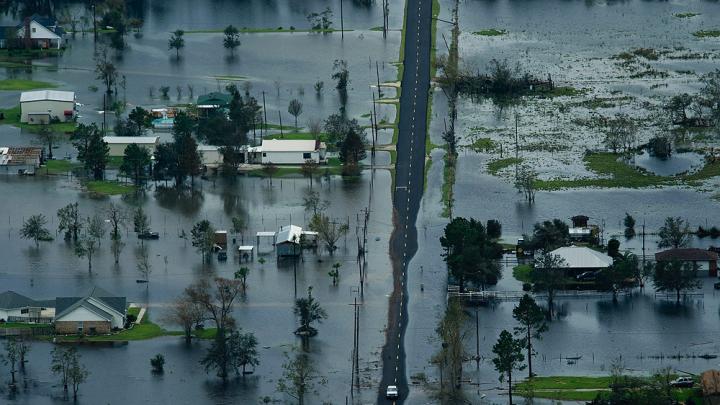Warming oceans—and the storms and rising sea levels they bring—will have their most severe impact on the southeastern shoreline of the United States, from the Texas Gulf Coast up to the Carolina Outer Banks. Mortgage lenders in the area have taken note. That’s according to a new study by Harvard researchers Jacob Bradt ’16 and Jesse Keenan on how lenders are preparing for sea level rise in coastal regions of the American South—a reaction with potentially calamitous consequences for the financial system.
In a paper published last month in Climatic Change, the two show that when a bank in these regions makes a loan to a homeowner in a flood-prone area, it is much more likely to repackage that mortgage into securities and sell it on the financial market. This means the buyers—whether private investors or government-sponsored entities like Fannie Mae and Freddie Mac, established to provide liquidity to the nation’s housing finance system—are taking on the financial risk of those homes flooding, without knowing what they’re signing up for. If these homes go—literally—underwater, the losses to banks, pension funds, and taxpayers could be enormous.
“Fifty-three percent of all the mortgages in those coastal counties that go to Fannie and Freddie are within a one-foot sea level rise zone,” says Keenan, who performed the research while a lecturer at Harvard’s Graduate School of Design. “That is an extraordinary concentration of environmental risk.”
This accumulation is only possible because “there aren't clear accounting rules in place for the type of risk that we’re talking about here,” says Bradt, a third-year Ph.D. student in public policy at the Harvard Kennedy School. Banks currently aren’t required to disclose how climate change affects the riskiness of mortgage-backed securities, so buyers can’t know when they’re buying financial instruments based on homes in the danger zone. Even if banks wanted to disclose the risk it’s not clear how they would assess it: the flood maps commonly used by insurance companies to determine risk, drawn up by the Federal Emergency Management Agency (FEMA), are notoriously incomplete and outdated. Instead of relying on these maps, Bradt and Keenan wondered whether banks were relying on “soft information”—the knowledge an individual banker has about her own community—to decide whether a mortgage was too risky to hold on to. Institutions that did most of their lending in a given area, they reasoned, might be better able to gather and use this information than a large, national bank.
The two ranked banks operating in coastal southeastern U.S. counties by their market concentration, and checked whether the most locally concentrated banks were being more careful about loans in low-lying areas. “We did observe a small impact on whether lenders were accepting different loans” says Bradt. “But the big behavior we observed was that once they made the loan, local lenders were talking these off their books at a much higher rate than more diversified lenders.”
Bradt is quick to point out that local banks turning mortgages into securities isn’t unexpected. Underwriting these mortgage-backed securities allows banks to spread the mortgage’s risk to institutions that are, theoretically, better able to handle it, and to make new loans before the first one is paid back. But if these securities turn out to be systematically riskier than expected, then Fannie Mae and Freddie Mac, or somebody’s pension funds, could lose a lot of money, leaving taxpayers or pensioners to foot the bill.
In their paper, the authors compare passing an unexpectedly-risky mortgage from one institution to the next to a game of musical chairs—except that, “[f]or many people, they may not even know that they are playing the game.”
When the music stops, the crisis could be similar in character to the 2008 housing crash, says Keenan—or even worse—with effects rippling through the economy. “There are a lot of ways you can parse this,” he explains, “but you’re talking about, in the next 30 years, tens of billions of dollars worth of mortgages that are at risk.”
Halting carbon emissions would improve the long-term outlook for these mortgages, but much of the sea level rise over the next few decades is already “baked in,” says Bradt, so the authors urge policymakers to address this in ways more directly than by mitigating climate change. Bradt hopes that a pair of bills before Congress, which would require financial institutions to disclose any climate-related risks, will force institutions not only to be transparent about these dangers, but to actually evaluate them in the first place.
“Nationwide, lenders currently don’t even have the capacity to evaluate loans that they originate themselves,” Bradt explains. “Requiring these types of disclosures, and the assessment of these types of risks, is important because it will drive these institutions to create that capacity.”
Building these risk assessments on the outdated flood maps would be like building a home on shifting sands. Bradt points towards efforts to update them—including by a non-profit he’s partnered with, the First Street Foundation—as essential for understanding and balancing the risks coastal communities face. Using data from First Street, Bradt and Kennedy School professor of the practice of public policy Joseph Aldy are researching how individual homeowners are adapting to flood risk, and how that risk is unequally distributed across socioeconomic groups. They hope to find a good way of managing the risk—before the music stops.









